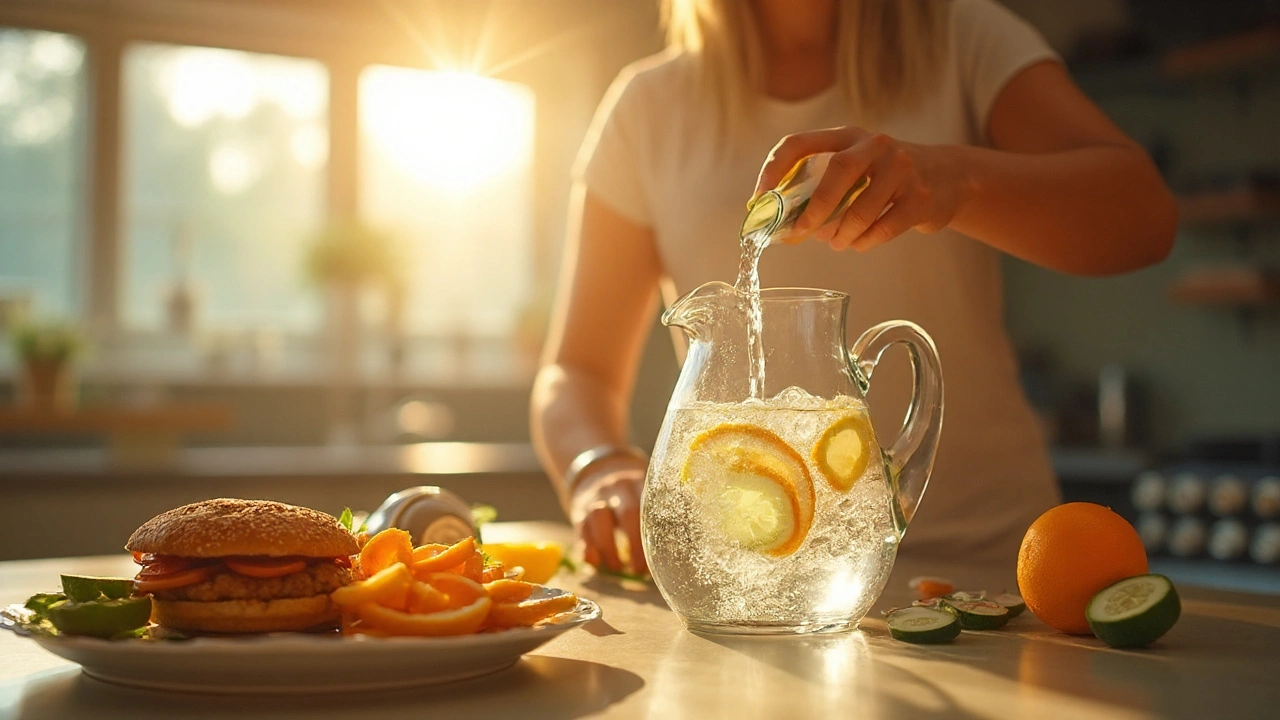Gastroenteritis is a medical condition characterized by inflammation of the stomach and intestines, leading to vomiting, diarrhea, abdominal cramps and fever. It can be caused by viruses, bacteria, parasites or food‑borne toxins, and it often leaves the body severely dehydrated.
When you add alcohol to the mix, the symptoms can magnify dramatically. Alcohol is a diuretic, irritates the gastric lining, and impairs the immune response that you need to fight off the infection. Understanding the exact mechanisms helps you choose what to cut out while you’re on the road to recovery.
Why Alcohol Makes Gastroenteritis Worse
First, alcohol increases dehydration. Even a single glass of wine can cause a loss of up to 200ml of water through urine. When you’re already losing fluids via vomiting and diarrhea, that extra loss pushes you into dangerous electrolyte imbalance.
Second, alcohol directly damages the stomach lining. Ethanol disrupts the mucosal barrier, making it easier for pathogens to invade deeper layers of the gut. This irritation also heightens nausea, turning a mild upset into relentless vomiting.
Third, alcohol hampers the body’s natural healing hormones. It reduces production of prostaglandins that protect the intestinal wall, and it interferes with the gut‑brain axis, which can worsen pain perception and delay the return of normal bowel movements.
Key Things to Avoid While Recovering
- Any alcoholic beverage - beer, wine, spirits, or even low‑alcohol cocktails. Even “light” drinks contain enough ethanol to worsen fluid loss.
- Caffeinated drinks (coffee, energy drinks) - caffeine is also a diuretic and can increase heart rate, adding stress to an already weak system.
- Spicy or heavily seasoned foods - capsaicin and strong spices further irritate the inflamed gut lining, leading to more cramps.
- Dairy products - lactose can be harder to digest during an acute episode, and many people develop temporary lactose intolerance after gastroenteritis.
- High‑fiber foods (raw vegetables, whole grains) - while normally healthy, they can bulk up stool and cause additional cramping when the gut is inflamed.
- Non‑steroidal anti‑inflammatory drugs (NSAIDs) such as ibuprofen or naproxen - these thin the protective mucus in the stomach, increasing bleeding risk.
- Smoking and second‑hand smoke - nicotine reduces blood flow to the gastrointestinal tract and impairs immune function.
Hydration Strategies That Actually Work
Replenishing lost fluids is the top priority. Plain water alone isn’t enough because you also need electrolytes (sodium, potassium, chloride) to restore balance.
Recommended options:
- Oral rehydration solution (ORS) - a precise mix of glucose and electrolytes; studies show it reduces dehydration duration by up to 50% compared with water alone.
- Clear broths (chicken, vegetable) - provide sodium and a small amount of protein without fat that could slow digestion.
- Diluted fruit juices (1 part juice to 3 parts water) - supply a modest potassium boost while keeping sugar levels low.
Avoid sports drinks that are high in sugar; they can draw water into the gut lumen and worsen diarrhea.
Safe Foods and Helpful Supplements
After the worst vomiting subsides (usually 24-48hours), introduce bland, easy‑to‑digest foods:
- Bananas - rich in potassium and gentle on the stomach.
- White rice or plain toast - low in fiber, easy to absorb.
- Applesauce - provides pectin that can help firm stools.
Supplements that may aid recovery:
- Probiotics (Lactobacillus rhamnosus GG or Saccharomyces boulardii) - clinical trials report a 30% reduction in diarrhea duration.
- Zinc - 20mg daily can shorten the course of viral gastroenteritis in children and may help adults.
- Antiemetic medication (e.g., ondansetron) - only under doctor’s advice, useful for persistent vomiting.

Alcohol‑Specific Risks: A Quick Comparison
| Alcohol Type | Typical Alcohol % | Dehydration Impact | Gastric Irritation Level |
|---|---|---|---|
| Beer | 4-6% | Moderate (high volume usually consumed) | Low‑to‑moderate |
| Wine | 11-14% | High (potent diuretic) | Moderate |
| Spirits | 40‑45% | Very high (small amounts cause strong diuresis) | High (direct mucosal damage) |
When to Call a Doctor
If any of the following occur, seek medical attention promptly:
- Persistent vomiting for more than 24hours
- Signs of severe dehydration (dry mouth, dizziness, scant urine)
- Blood in vomit or stool
- High fever (>38.5°C) lasting more than two days
- Severe abdominal pain that doesn’t ease with rest
In such cases, a doctor may prescribe IV fluids, anti‑emetics, or antibiotics if a bacterial cause is identified.
Putting It All Together
Recovering from gastroenteritis is a race against fluid loss and gut irritation. By eliminating all forms of alcohol, caffeine, spicy and fatty foods, and by prioritising ORS, gentle broths and probiotic‑rich supplements, you give your body the best chance to heal quickly. Remember, the gut needs time - re‑introduce normal foods only when symptoms have clearly subsided.
Frequently Asked Questions
Can a small amount of alcohol help me relax while I’m ill?
Even a modest sip can increase fluid loss and irritate the stomach lining, outweighing any temporary relaxation benefit. It’s safest to avoid alcohol entirely until you’re fully rehydrated.
Is it okay to drink coffee during gastroenteritis?
Coffee is a diuretic and can exacerbate dehydration. Switch to herbal teas or clear broths until the vomiting stops, then re‑introduce coffee slowly if you tolerate it.
How long should I wait before eating solid food?
Typically 24-48hours after the last vomiting episode. Start with bland, low‑fiber options like toast, bananas, or rice. Gradually add more variety as symptoms improve.
Do probiotics really shorten the illness?
Clinical evidence suggests certain strains (e.g., Lactobacillus rhamnosus GG) can reduce diarrhea duration by up to a third. Choose a reputable supplement and start once you can keep liquids down.
What signs show I’m dangerously dehydrated?
Look for dry mouth, extreme thirst, dark urine, rapid heartbeat, dizziness, or confusion. If two or more appear, seek medical care immediately for IV fluid therapy.

Stuart Palley
September 23, 2025 AT 16:02Alcohol with gastroenteritis is like throwing gasoline on a fire and then asking why your house is gone
Everyone knows this but somehow people still try to sip wine while puking into a bucket like it’s a sad poetry night
Glenda Walsh
September 24, 2025 AT 07:47Wait-wait-wait-I need to say this very carefully-because this is so important-please don’t take this the wrong way-but if you even think about having one sip of beer while you’re sick-you are not just being irresponsible-you are actively sabotaging your own healing process-and yes-I’m talking to YOU-and I’ve seen this too many times-please stop-just stop-
Tanuja Santhanakrishnan
September 24, 2025 AT 20:38Love this breakdown! 🌿 I’ve seen so many folks in India reach for whiskey thinking it’ll ‘kill the bugs’-but it’s the opposite! The gut’s already screaming for mercy, and alcohol? It’s like kicking a dog that’s already down.
Stick to coconut water + ORS + bananas-your belly will thank you with a quiet, happy hum. Probiotics? Yes please! I swear by Saccharomyces boulardii-it’s like sending in the ninja healers of the microbiome. You got this, warrior! 💪
Raj Modi
September 25, 2025 AT 13:05It is of paramount importance to underscore the physiological mechanisms underlying the exacerbation of gastroenteritic symptoms through ethanol consumption, as elucidated in the preceding exposition. Ethanol, as a volatile organic solvent, exerts a denaturing effect upon the mucosal glycoprotein matrix of the gastric epithelium, thereby compromising the integrity of the mucosal barrier and facilitating translocation of pathogenic agents. Furthermore, the diuretic properties of ethanol, mediated through inhibition of vasopressin secretion, precipitate a state of hypovolemia which, in the context of concurrent fluid losses via emesis and diarrhea, engenders a critical electrolytic imbalance, particularly in sodium and potassium. This phenomenon is compounded by the suppression of prostaglandin synthesis, which normally confers cytoprotection to the gastrointestinal mucosa. Consequently, the ingestion of even trace quantities of alcoholic beverages constitutes a contraindication during the acute phase of gastroenteritis, and a strict abstinence protocol should be observed until full clinical resolution of symptoms and normalization of hydration parameters has been achieved.
Cecil Mays
September 26, 2025 AT 09:32YES YES YES to the ORS and bananas!! 🍌💧 I was sick last month and thought I’d be cool and sip a beer-BIG MISTAKE. Felt like my insides were sandpaper. Switched to coconut water + electrolyte packets and BOOM-felt human again in 12 hours. Probiotics? Game changer. I took two a day and my gut went from ‘war zone’ to ‘chill beach vibe’ 🏖️ You’re not weak for resting-you’re wise. Go easy on yourself. You got this, fam!
Sarah Schmidt
September 27, 2025 AT 03:13There’s a deeper truth here, beyond the clinical facts: alcohol isn’t just a chemical irritant-it’s a metaphor for how we treat ourselves when we’re vulnerable. We numb, we escape, we justify small indulgences because we think we’ve earned them, or because we’re afraid of stillness. But the body doesn’t negotiate. It doesn’t care if you had a hard week. It just asks for rest, for water, for silence. To drink while your gut is screaming is not rebellion-it’s self-betrayal. Recovery isn’t about discipline. It’s about listening. And sometimes, the most radical act is doing nothing at all. Especially when that nothing includes leaving the whiskey on the shelf.